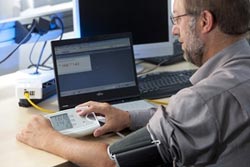Smartphone Supports Safe Dialysis at Home

In an unparalleled field test, selected dialysis patients in Berlin will soon be equipped with a telemedical support system that will enable them to independently perform peritoneal dialysis under daily remote supervision by their doctors.
The field test will be conducted over a period of several months as part of the Smart Senior project funded by the German Ministry of Education and Research. The aim of the project is to improve senior citizens' quality of life and enable them to live a largely independent life at home.
The share of patients who require regular dialysis due to renal failure is increasing from year to year. Around 60,000 people need dialysis in Germany alone, and their treatment costs billions of euros each year. One of the methods used is peritoneal dialysis (PD), in which the peritoneum serves as the body's own filter for the blood. PD does not impair the patient's circulation and can be performed daily at home overnight.
However, possible complications include undesirable weight gain and fluctuations in blood pressure. To prevent such complications, once a month the doctors treating the case check the PD patient's key medical data regarding factors such as weight and blood pressure, as well as the dialysis data.
However, for elderly patients in particular this interval is too long. As a result, their home PDs frequently have to be discontinued and the dialysis must performed at the hospital.
The new telemedically supported peritoneal dialysis (TAPD) could help make PD safer and more patient-friendly in the future, and at the same time make it usable for a larger number of patients. Siemens' global research unit Corporate Technology is working on TAPD in cooperation with the Vivantes Clinic, the Telemedicine Center Charité (TMCC), Prisma, Tembit, and other partners from the fields of research and industry.
During the field test, a smartphone app lists the key medical data that have been agreed on with the doctor. The app tells the patient how to measure his or her blood pressure, heart rate, blood oxygenation, and ECG, for example. Via a special network node known as the Medibox, the measuring equipment transmits the encrypted values along with a pseudonym to the dialysis center.
The app makes sure that the data has actually reached its destination. This data is subsequently stored in the patient's file on the TMCC server. The doctor checks the key medical and treatment data each day and is also automatically notified of any irregularities. This enables doctors to detect changes in the patient's health earlier than has previously been the case so that the patient can be immediately contacted to prevent complications from occurring.
Media Contact
More Information:
http://www.siemens.com/innovationnewsAll latest news from the category: Health and Medicine
This subject area encompasses research and studies in the field of human medicine.
Among the wide-ranging list of topics covered here are anesthesiology, anatomy, surgery, human genetics, hygiene and environmental medicine, internal medicine, neurology, pharmacology, physiology, urology and dental medicine.
Newest articles

Skyrmions move at record speeds
… a step towards the computing of the future. An international research team led by scientists from the CNRS1 has discovered that the magnetic nanobubbles2 known as skyrmions can be…

A flexible and efficient DC power converter for sustainable-energy microgrids
A new DC-DC power converter is superior to previous designs and paves the way for more efficient, reliable and sustainable energy storage and conversion solutions. The Kobe University development can…

Technical Trials for Easing the (Cosmological) Tension
A new study sorts through models attempting to solve one of the major challenges of contemporary cosmic science, the measurement of its expansion. Thanks to the dizzying growth of cosmic…





















